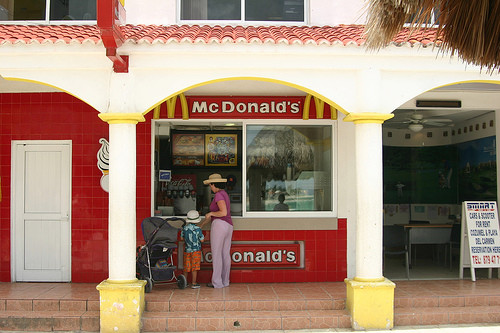Mexican Senate Approves Tax Reform; Junk Food Will Be Taxed 8% Along With Soda

After months of discussion and controversy, a much-contested tax reform was approved by the Mexican Senate Tuesday night, but it was not an easy last step. The session extended to more than 13 hours, after which President Enrique Peña Nieto’s proposal was approved with 73 votes for and 50 against.
The reform aims to increase revenue for the government, by an amount estimated for 2017 at 230 billion pesos (approximately $17 billion). The new measures include an increase in the income tax for those who make over 500,000 pesos a year (around $39,000), a figure that may appear low to North Americans but is triple the average Mexican household income, as measured by the OECD this year.
Other measures include a uniform VAT across all of Mexico -- thus ending the privileges of border states close to the U.S., Guatemala and Belize, which had a VAT of 11 percent, as opposed of the 16 percent of the rest of the country -- and the much-debated soda tax, which may help reduce a worrying obesity rate, currently the highest in the world.
Yet the Senate introduced some changes to the initial government proposal. The soda tax, which will increase the price of soft drinks 10 percent, was expanded to junk food as well. Fast food sales will be taxed 8 percent, starting Jan. 1. Sen. Angélica de la Peña said the previously suggested tax of 5 percent was “not enough to cover even the 6 percent of the public expense incurred from treating health problems given by junk food.”
Basic groceries like milk, bread and fruit will not be affected by any tax increase. Peña Nieto said during the debate that this measure was just the first step toward a campaign to change eating habits. Mexico was recently revealed to have the world’s worst ratio of overweight people, with more than a third of the population fitting the definition of obesity.
The tax will mean an increase in prices in fast food items, which could hurt several popular American chains south of the border. McDonald's (NYSE:MCD), with just over 300 restaurants in the 32 Mexican states, is the company with the largest presence -- and it wants to expand it. McDonald's regional director José Villarreal announced in August that it would reach out to more remote parts of the country by bringing restaurants to towns with fewer than 100,000 residents.
Villarreal also told CNN Expansión that it is the company's policy to keep its food affordable to all -- therefore, it will look for strategies to keep the tax hike from affecting prices.
The fast-food tax, which has been compared to New York Mayor Michael Bloomberg’s drive to ban supersized sodas, was the target of many complaints during the debate. Entrepreneurs and business owners, in particular, feared the measure would cut their sales. Mexico is currently the largest consumer of soda per capita in the world: the average Mexican drinks 163 liters (43 gallons) of soda a year.
The homogenization of the VAT also has seen its share of controversy. Traditionally, border states had many businesses benefitting from the lower VAT, as well as tourist hotspots like Quintana Roo, that lure travelers with low prices as well as beautiful beaches. Some senators, like Carlos Ángulo from the opposition Partido Acción Nacional, have argued that the higher tax will result in a loss of revenue for the businesses. “The reform is going to cause a tax chaos, not to mention how it hurts the competitiveness principle,” he said.
The reform will go back to Congress for the small changes made to the original to be approved. The law is expected to come into force on Jan. 1.
© Copyright IBTimes 2024. All rights reserved.











